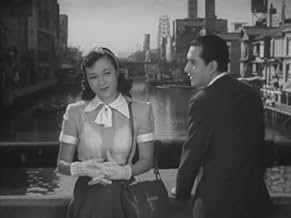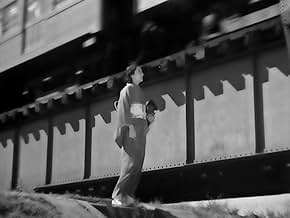Meshi
- 1951
- 1 घं 37 मि
IMDb रेटिंग
7.6/10
1.9 हज़ार
आपकी रेटिंग
अपनी भाषा में प्लॉट जोड़ेंMichiyo lives in a small home in Osaka and is not happy with her marriage; all she does is cook and clean for her husband.Michiyo lives in a small home in Osaka and is not happy with her marriage; all she does is cook and clean for her husband.Michiyo lives in a small home in Osaka and is not happy with her marriage; all she does is cook and clean for her husband.
- पुरस्कार
- कुल 9 जीत
फ़ीचर्ड समीक्षाएं
A sensitive look at an unhappy housewife, with fine performances by Setsuko Hara as the wife and Ken Uehara as the everyman schlub she's married to, and incisive dialogue and characterization by, among others, Nobel Prize winning novelist Yasunari Kawabata, this film ultimately succumbs to overly deliberate pacing, too many sub plots that go nowhere and add nada, a sexist ending that is an ode to wifely submission and a general sense, for me at least, that I'd rather be watching Ozu. Give it a B minus. PS...Coulda used more of the cat and less of Satoko.
Hara gives a stellar performance. However, if you're new to her or if you're new to Japanese films, period, then this is not the place to start. Unfortunately, I find this film boring. I would've given it a 4, but Hara's performance bumps it up at least three stars to a 7.
There is no plot, just the point that Hara's character feels trapped in a boring marriage as she leads a mundane existence. There's no real action, no intense conflict--at least none that isn't internal. This is purely a character study and psychological look into a failing marriage.
I will say that the movie, in my opinion, does an excellent job at reminding us that marriage is meant to be forever but that doesn't mean it will always be a source of joy. It's just like life, in general--it's a mix of pleasant and unpleasant and, yes, even mundane experiences. And I tip my hat to the director for expressing that so keenly.
But the truth is, I wanted to stop watching halfway through because I was bored. I kept watching, though, because of Hara. What an amazing actress she was.
There is no plot, just the point that Hara's character feels trapped in a boring marriage as she leads a mundane existence. There's no real action, no intense conflict--at least none that isn't internal. This is purely a character study and psychological look into a failing marriage.
I will say that the movie, in my opinion, does an excellent job at reminding us that marriage is meant to be forever but that doesn't mean it will always be a source of joy. It's just like life, in general--it's a mix of pleasant and unpleasant and, yes, even mundane experiences. And I tip my hat to the director for expressing that so keenly.
But the truth is, I wanted to stop watching halfway through because I was bored. I kept watching, though, because of Hara. What an amazing actress she was.
Gentle and touching portrait of a marriage. Setsuko Hara and Ken Uehara play a young married couple who have been living in Osaka for a while now, after having met and married in Tokyo. Life in Osaka is pretty dull, especially for Hara, who does little but housewife day in and day out. Uehara doesn't make much money, and his job prospects are weak. They're in a rut. When Uehara's beautiful young niece comes for an unannounced visit, Hara's dissatisfaction with life becomes too much to bear. As is usual for Naruse, the characters are extremely well developed and their emotional dilemmas are very easy to sympathize with. The acting is excellent throughout, with Hara giving one of her very best performances.
"Have you ever thought of what I'm feeling, living this life day after day? Is this what marriage means? I feel like a maid. I slave away all day long doing laundry and preparing meals."
There is a lovely bit of feminism in how this film shows how unfair traditional society is, with a woman expected to be subservient to a man's needs and put up with him staying out late getting drunk. Ironically, all of the friends of the wife (Setsuko Hara) tell her how lucky she must be being "happily married," while she suffers behind a smile or casting down her eyes. When they ask her what she talks about with him, she replies simply that she has a cat. While she carefully manages the household finances, he goes out and buys a fancy pair of shoes, seemingly oblivious. It's infuriating to watch, and when his spoiled niece (Yukiko Shimazaki) turns up looking for a place to stay, things get worse, as she now has two loafers around the house.
The scenes in Osaka that Naruse gives us are as beautiful as the two leading ladies, making the film a visual treat. There is also a depth of feeling to what Hara's character is going through, and that's what made the film for me. At the outset of the film she asks "I had hopes and dreams before. Where have they gone?" and "With a life restricted to the kitchen and the family room, must every woman grow old and die feeling empty?" It was liberating to see her take action and leave for Tokyo, not writing her husband (or sadly, being written to).
The husband (Ken Uehara) is a better person around his niece, and weirdly we see flirtation between the two, as well as a cousin of the wife's lightly hitting on her. They both know to draw the line at adultery though, and while the film is certainly showing the husband in a negative light, it seems to be saying more that these are two average, decent people in a marriage, and cautioning husbands to treat their wives better. Bravo for that, but at the same time, the "stand by your man" aspect definitely didn't work for me 70 years later. He's aware she's had a hard time, but not aware of his own role in that, and how he's taken her completely for granted. It makes for an unsatisfying finish, but for the things it was able to accomplish in 1951, I liked it.
There is a lovely bit of feminism in how this film shows how unfair traditional society is, with a woman expected to be subservient to a man's needs and put up with him staying out late getting drunk. Ironically, all of the friends of the wife (Setsuko Hara) tell her how lucky she must be being "happily married," while she suffers behind a smile or casting down her eyes. When they ask her what she talks about with him, she replies simply that she has a cat. While she carefully manages the household finances, he goes out and buys a fancy pair of shoes, seemingly oblivious. It's infuriating to watch, and when his spoiled niece (Yukiko Shimazaki) turns up looking for a place to stay, things get worse, as she now has two loafers around the house.
The scenes in Osaka that Naruse gives us are as beautiful as the two leading ladies, making the film a visual treat. There is also a depth of feeling to what Hara's character is going through, and that's what made the film for me. At the outset of the film she asks "I had hopes and dreams before. Where have they gone?" and "With a life restricted to the kitchen and the family room, must every woman grow old and die feeling empty?" It was liberating to see her take action and leave for Tokyo, not writing her husband (or sadly, being written to).
The husband (Ken Uehara) is a better person around his niece, and weirdly we see flirtation between the two, as well as a cousin of the wife's lightly hitting on her. They both know to draw the line at adultery though, and while the film is certainly showing the husband in a negative light, it seems to be saying more that these are two average, decent people in a marriage, and cautioning husbands to treat their wives better. Bravo for that, but at the same time, the "stand by your man" aspect definitely didn't work for me 70 years later. He's aware she's had a hard time, but not aware of his own role in that, and how he's taken her completely for granted. It makes for an unsatisfying finish, but for the things it was able to accomplish in 1951, I liked it.
Unsubbed, so I cannot really review it properly. Setsuko Hara is radiant though quite bland as the housewife who gets fed up with her husbands deroutes, especially regarding his (rather innocent) adventures with a young niece. She moves back with her relatives, but once hubby shows up in a more humble state, all is forgiven. I don't think much else actually happened, but the film is given to describing the everyday tasks and problems rather than great melodrama. Although Ozu is hailed as the great Japanese director for the Japanese, it seems to me that Naruse's film are more effortlessly showing the natural life of Mr. and Mrs. Japan, while Ozu's often come across as more staged tableaux. This is likely because of the invariably fixed and central camera Ozu employs, which makes the room in which a scene takes place appear as a stage and the action strictly choreographed. Compared with Ozu Naruse's camera is quite more engaged, however subtle the movements and variations may be, and he makes more frequent use of semi-close ups and reaction shots.
क्या आपको पता है
- ट्रिवियाThis film revived the shomingeki sub-genre in which lower middle class and struggling families are depicted.
- भाव
Michiyo Okamoto: [voiceover] My husband is sitting at the table. I bring a pot of miso soup from the kitchen. Yesterday, today, and tomorrow, for 365 days a year, morning and night, come and go unvaryingly. With a life restricted to the kitchen and the family room, must every woman grow old and die feeling empty?
- कनेक्शनReferenced in Century of Cinema: Nihon eiga no hyaku nen (1995)
टॉप पसंद
रेटिंग देने के लिए साइन-इन करें और वैयक्तिकृत सुझावों के लिए वॉचलिस्ट करें
विवरण
- चलने की अवधि1 घंटा 37 मिनट
- रंग
- ध्वनि मिश्रण
- पक्ष अनुपात
- 1.37 : 1
इस पेज में योगदान दें
किसी बदलाव का सुझाव दें या अनुपलब्ध कॉन्टेंट जोड़ें






























